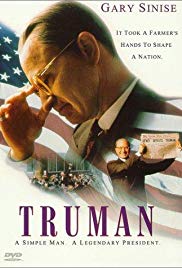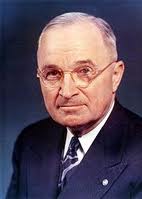TRUMAN
SUBJECTS — Biography; U.S./1941 – 1991;
SOCIAL-EMOTIONAL LEARNING — Leadership;
MORAL-ETHICAL EMPHASIS — Responsibility.
AGE: 12+; MPAA Rating — PG (for language and some war footage);
Drama; 1995; 57 minutes; Color.
There is NO AI content on this website. All content on TeachWithMovies.org has been written by human beings.

SUBJECTS — Biography; U.S./1941 – 1991;
SOCIAL-EMOTIONAL LEARNING — Leadership;
MORAL-ETHICAL EMPHASIS — Responsibility.
AGE: 12+; MPAA Rating — PG (for language and some war footage);
Drama; 1995; 57 minutes; Color.
TWM offers the following worksheets to keep students’ minds on the movie and direct them to the lessons that can be learned from the film.
Film Study Worksheet for Social Studies Classes for a Work of Historical Fiction and
Worksheet for Cinematic and Theatrical Elements and Their Effects.
Teachers can modify the movie worksheets to fit the needs of each class. See also TWM’s Historical Fiction in Film Cross-Curricular Homework Project.
This film depicts scenes from the life of Harry S. Truman, 33rd President of the United States.
Selected Awards:
1996 Emmy Awards for a Miniseries or Special: Outstanding Made for Television Movie; Casting; 1996 Golden Globe Awards: Best Actor in a miniseries or Made for TV Motion Picture(Sinise); 1996 Screen Actors Guild Award: Best Actor in a TV Movie or Miniseries; 1996 Emmy Awards Nominations for a Miniseries or Special: Writing; Editing-Single Camera Production, Makeup, Sound Mixing, Lead Actor (Sinise); Supporting Actress (Scarwid); 1996 Golden Globe Awards Nominations: Best Miniseries or Made for TV Motion Picture.
Featured Actors:
Gary Sinise, Diana Scarwid, Richard A. Dysart, Colm Feore, Nora Denney, James Gamon, Jessica Drake.
Director:
Frank Pierson.
“Truman” will serve as an introduction to the career of Harry S. Truman.
NONE. There is some mild profanity in the film.
Skim the Helpful Background section. Take one incident or fact from Truman’s life that interests you and discuss it with your child. Then ask and help your child to answer the Quick Discussion Question.

Harry S. Truman (1884 – 1972) served as president from 1945 – 1953. Before the 1944 election, the people around Roosevelt knew that he was ill and didn’t expect him to survive his fourth term. They knew that in choosing Truman, Roosevelt was picking the next president.
Truman was the 33rd President of the United States. His administration saw the successful completion of the Allied victory in WWII, demobilization, the first post-Depression civilian economy, and the first phases of the Cold War. Truman and his advisers were the architects of the policy of containing the Soviet Union.
In the First World War, Truman served as Captain for an artillery company. After the war he opened a clothing store which went bankrupt ten years later. Over many years, Truman repaid all his debts. Capitalizing on his war record, he won election as County Judge and later as Supervising Judge. The main duties of the County Judges were to supervise the maintenance of county roads and buildings. As Supervising Judge, Truman fired political appointees who were not doing their jobs, reduced the county debt, and actually maintained the county roads and buildings. Truman was often supported by the Pendergast political machine based in Kansas City. Truman repaid this support with loyalty but he was honest, incorruptible and not subservient to the Pendergasts. The machine and Truman’s honesty and efficiency carried him to the U.S. Senate.
In Washington, Truman was at first considered a creature of the Pendergast machine and not taken seriously. But some political leaders did see that he was serious about providing good government and he was assigned to a committee investigating inefficiency and waste in the fast-growing defense industry. Truman pursued the investigation zealously and won national recognition for his work.
Perhaps Truman’s most controversial decision was to drop atomic bombs on Hiroshima and Nagasaki. The U.S. is the only country to have used atomic weapons in war. See Lesson Plan on Mass Casualties.
Truman’s successes came largely in the foreign policy arena with the Marshall Plan, the establishment of NATO and the United Nations, the recognition of Israel and the policy of containment of the Soviet Union, including resistance to communist aggression in Korea. On the home front, Truman’s policies were usually defeated by a hostile Congress. He did, however, by executive order, integrate the armed forces.
In the 1948 elections the Republican candidate, New York Governor Thomas E. Dewey, was heavily favored to win. Truman called a special session of the Republican-controlled Congress to allow the Republicans to enact their party platform into law. When they did nothing, he campaigned against the “do-nothing” Congress. To almost everyone’s surprise, Truman won the election.
Truman was willing to make tough decisions and to take responsibility for his decisions. He had a sign on his desk that read “The buck stops here.” This trait made him controversial in his own time but admired by many Americans and, later, by historians.
Truman is criticized today for his failure to stand up to the McCarthyites and his imposition of a loyalty program (complete with required oaths of loyalty) in the Federal Government.
George S. Marshall was a revered Army general and one of the architects of the Allied victory in World War II. He served as Secretary of State under Truman. Marshall was the architect of a plan to support the rehabilitation of all of Europe rather than see it fall to the communists. Truman revered Marshall. Marshall resigned over Truman’s decision to recognize Israel. Marshall wanted to favor the Arabs.
Douglas MacArthur had served with distinction in the Pacific during the Second World War. He was the military governor of Japan and responsible for policies which permitted that country to come back as a Western-style democracy after the war. But somewhere along the line, MacArthur forgot the constitutional provision that provides for civilian control over the military. During the Korean war, MacArthur was at odds with the policies of President Truman. Truman was striving to keep the war from escalating into a third world war. MacArthur wanted to wage total war and use all of the weapons at the command of the U.S. He wanted to bomb bases in China which were being used by the North Koreans as sanctuaries. He wanted to use nuclear weapons to counter the massive numbers of Chinese Army troops which had been committed to the war. These were feelings were understandable for a soldier who wanted to win the war but they were too narrow to dictate policy for the entire U.S. or for the entire free world. The wider picture was Truman’s paramount concern.
MacArthur became insubordinate and at the height of MacArthur’s popularity at home, Truman fired him. It was a very unpopular decision. MacArthur came home to parades and addressed both houses of Congress. He tried for a political career but it faded. Students of government now realize that Truman’s decision to fire MacArthur was necessary to preserve the principle of civilian control over the military.
1. See Discussion Questions for Use With any Film that is a Work of Fiction.
2. Must a President always be honest? If not, in what areas can he be dishonest?
3. Truman was loyal to his Secretary of State, Dean Acheson when Acheson was unfairly attacked by Joseph McCarthy and others on false charges of harboring communists in the State Department. Richard Nixon was loyal to his lieutenants Haldeman and Ehrlichman when they implicated in the Watergate scandal. Truman has been praised by historians for his loyalty to Acheson. Nixon was forced to resign for what he did to try to protect his aides. What was the difference?
4. Should Truman have fired General MacArthur? Why is civilian control over the military considered to be a pillar of strength in our government?
5. Name three decisions that Truman took which have been praised by historians and one that has been criticized.
1. Name three actions taken by President Truman that displayed leadership.
2. Name three controversial decisions that President Truman took which were unpopular at the time but which turned out to be very beneficial to the United States.
Discussion Questions Relating to Ethical Issues will facilitate the use of this film to teach ethical principles and critical viewing. Additional questions are set out below.
(Do what you are supposed to do; Persevere: keep on trying!; Always do your best; Use self-control; Be self-disciplined; Think before you act — consider the consequences; Be accountable for your choices)
(See Quick Discussion Question.)
In addition to websites which may be linked in the Guide and selected film reviews listed on the Movie Review Query Engine, the following resources were consulted in the preparation of this Learning Guide:
This Learning Guide was last updated on December 18, 2009.